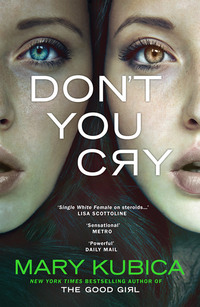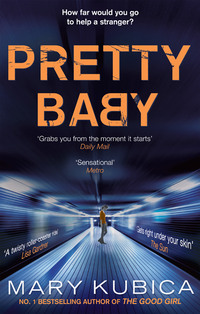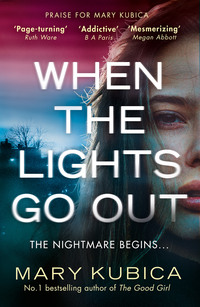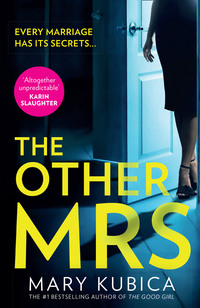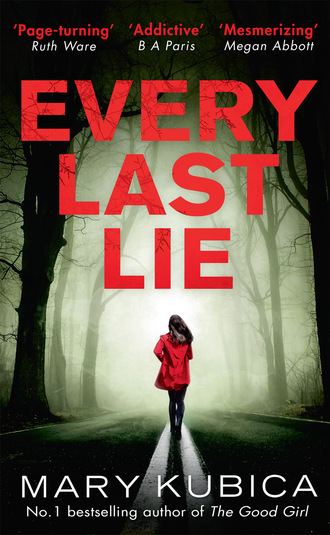
Полная версия
Every Last Lie
Suburban sprawl they call this, when the expanding population spills into rural America, making Chicagoland home to over ten million people. Our suburb is often outclassed by some of the more sought-after towns around, and yet the new construction in our area is second to none; for half the money you get twice the house, a promise that lures people in droves. The schools are top-notch, the demographics just what Nick and I were looking for when we purchased our home: a white-collar community with a median age of thirty-two. There would be plenty of kids for ours to play with. Good kids. Good kids whose college-educated parents made over a hundred thousand a year. Crime in the community was limited to theft mainly; violent crimes almost didn’t exist.
As we drive through the cornfields, past newer subdivisions that flaunt their energy-efficient and custom-made homes, Maisie idly kicks the back of the passenger’s seat and chants, “Faster, Mommy, faster.” Maisie likes to do things quickly. But I will not speed despite Maisie’s request; I know better than to speed.
We work our way to the main hub of town. I park in the grocery store lot, sliding in between a minivan and a pickup truck, and heft Felix and his baby carrier from the car, urging Maisie to follow suit. But Maisie doesn’t follow suit.
“Come on, Maisie,” I beckon. “The sooner we finish, the sooner we can go home.”
But Maisie just kicks her feet against the back of the passenger’s seat, refusing to come. She grips my phone in her hands, the annoying Candy Crush theme music making my head ache. “Come on, Maisie,” I try again, changing tack. I say this time, “You can play the game inside.”
But Maisie doesn’t come.
I gather a shopping cart from the rack outside and set Felix and his carrier inside, moving to Maisie’s side of the car. Snatching the phone from her hands, I listen to Maisie squeal. She fights me as I unfasten the harness and try to force her arms and legs to the other side of the woven strap. “No!” she says as she kicks her hot-pink Crocs at me.
“Get out of the car right now,” I insist, and it takes every ounce of patience I have not to snap. Fatigue and grief are a lethal combination, though I can’t give in to despair. I might have lost my husband, but Maisie has lost her father. Though she doesn’t quite know it yet, she, too, has been hurt. I stroke her hair and ask nicely for her to come.
“No, no, no, no, no,” she bleats as I wrench her small body now—all thirty-seven pounds of her—out of the car and onto the concrete, holding her hand too tightly so that Maisie cries out in pain. By now Felix, too, has begun to cry, awoken by the glaring afternoon sun, which blares in his half-open eyes. The car has stopped moving, the undulating motion that lulled him to sleep gone. He whimpers first, and then he screams, and I grope at my pockets for something to plug the leak. I find his pacifier and stuff it into his mouth, less gently than I would have liked to, and begin to push the cart with one hand while dragging Maisie with the other across the lot.
All that I want is infant formula. Infant formula and baby bottles.
“We’ll be in and out in three minutes,” I promise Maisie, but three minutes is a lifetime to a child. The warmth of the day engulfs us the second we step from the air-conditioned car, heat rising up from the blackened asphalt beneath our feet. The store seems suddenly so far away as Maisie schleps along with tiny, baby-sized steps, her hand trying to wiggle free of mine. I make promises; I offer rewards. “We’ll get popcorn when we’re through,” I say, telling her how we can swing by the food court on the way out. “A Slurpee, too,” I say, hoping that the promise of a frosty soda drink will make Maisie pick up the pace. But Maisie doesn’t pick up the pace. If anything, her feet slow, her hand pulling back on my hand so that there’s the sensation of swimming upstream. The single word—no—continues on repeat as I push Felix and tow Maisie through the parking lot while passing mothers turn with steely eyes to stare, and I see in their eyes the judgment, the condemnation, the disapprobation. Oh, how easy it is to judge when we don’t know. Maisie’s feet drag along the concrete, her objections becoming more and more shrill as she quietly—and then forcefully—screams, “No!”
It’s then that Felix’s pacifier manages to fall from his mouth and onto the blistering tar; in one fell swoop, I pick it up and stuff it back into his mouth before he has a chance to notice its absence, not caring what dirt or germs now live on the end of that plastic device but needing him quiet. His idle sucking resumes, though Maisie is now completely inert, standing in the middle of the parking lot, pointing. Pointing and crying. Pointing at a car, a black car, though from the distance I can’t see its make or model. All I know is that it is black and dusty, the cause of Maisie’s sudden and inexplicable tantrum.
Her body has begun to shake uncontrollably; urine creeps from below the hem of a knitted dress and down the inside of her wobbly leg, collecting in the sole of her hot-pink Crocs. Maisie, who has already peed three times before we could leave. One wouldn’t think there was any more urine left to pee. But there it is, the amber liquid trickling to the asphalt as Maisie manages to wrench her hand free of mine and makes an attempt to run. I blame the sweat for this, the slippery moisture slathered between our hands, as she sprints across the parking lot without looking for cars, so that another driver must slam on the brakes to keep from hitting Maisie, issuing me a dirty look as she does.
I’m so sorry, I’m so sorry, I mouth as I steer the cart across the lot to try to reclaim the little girl who now darts pell-mell through the rows of parked cars. I am faster than Maisie, this much I know, and yet with Felix and the shopping cart in tow, I’m not as sprightly as she. I can’t squeeze through the rows of cars like Maisie can, going this way and that like the steel ball of a pinball machine. My heart races, waiting for the blare of a car horn, the squeal of brakes, a little girl’s agonizing cry.
“Maisie!” I call to her over the still summer air. “Maisie!” I scream, so that half the town’s population, it seems, turns to see what the fracas is all about, pointing in lukewarm concern at the little girl running recklessly through the parking lot, two matted pigtails streaming down her back. Felix again loses his hold on his pacifier, but I can’t be slowed down. Over the sound of my own screaming, Felix, too, begins to scream. I grab Felix from the shopping cart and begin to run, though the weight of his infant carrier slows me down, my legs like lead.
Others in the parking lot turn to look at Maisie, but none do a single thing to stop her. Instead their eyes travel to me, wondering what kind of mother I am that I let my daughter run like this through a crowded parking lot. Don’t I know how dangerous this is?
“Clara?” I hear a voice then, kind, concerned. I turn. Emily, my neighbor and friend. She stands too closely and places a hand on my arm, and I see her little four-year-old, Teddy, obediently standing by her feet, without the need to hold hands. “What’s happened, Clara?” she asks, her desperate voice mimicking my own. “What’s wrong?”
“Maisie,” I say, and before I can tell her or even point to Maisie off in the distance, streaming through the rows of cars that gleam in the afternoon sun, Emily tells Teddy to stay with me and then takes off in a sprint. Emily is a fast runner, much faster than Maisie is, without the baggage that slows me down. I watch as Emily’s own long black hair billows behind her, her legs sailing through the parking lot with ease, closing the gap on Maisie, and collecting my little girl into her arms just like a good mother would do.
But not me. No, not me.
Rather, I stand idly by while some other woman saves my child.
“No, no, no, no, no,” says Maisie as she is returned to me, tears streaming from her eyes. She’s sweaty, her hair glued to the hairline. She kicks in Emily’s arms, wanting to be free. But Maisie doesn’t look at either of us, not Emily nor me, but rather at that black car, now parked two and a half rows behind us so that it’s near impossible to see. But I follow the route of Maisie’s terrified eyes to where the car should be and am absolutely certain that’s where she looks because she’s told me already, or rather implied it, that it was a black car that took Nick’s life, puzzle pieces I’ve gathered from Maisie’s cagey innuendos and placed together with care.
“Stop this, Maisie,” I say about her outburst, though I cling to her, my heart still pounding, knowing I was one distracted driver away from losing a child. How easy it would have been for a car to hit her, just one driver checking an incoming text message in the parking lot or peering over a shoulder to reprimand a child. That’s all it would have taken, one split second of distraction as Maisie tore across the parking lot and into their path. “Do you know what could have happened to you? You have to be more careful, Maisie. You have to hold an adult’s hand in the parking lot. Always,” I say, and then again, more forcefully, “always.”
“Thank you, Emily,” I say to the woman who stands before me, watching but not judging. “Thank you, thank you. I don’t know what would have happened if...” But I don’t finish the sentence; I can’t bear to say the words out loud. My hair, too, clings to my sweaty face; the sweat pools beneath my arms and in the crooks of my knees. Everywhere there is sweat.
“It’s all right,” she says, and, “No bother,” though her eyes inquire about Maisie’s outburst, and I palliate the truth by saying, “She doesn’t want to go grocery shopping. She’d rather stay home and play,” though I make no mention of the black car, which has her instantly terrorized, or the fact that my four-year-old has some latent belief that my husband was killed.
“Grocery shopping is so hard with the children,” Emily bemoans with a dramatic eye roll, though her little Teddy stands obediently beside her, carrying the plastic shopping bag. “Would you like to come home with Teddy and me?” asks Emily then, as she squats at the knees and leans in close to Maisie, her voice subdued in a way meant for kids’ ears. “Give Mommy a break for a while?” And as Maisie nods her slow approval, Emily rises up and says to me, “If it’s okay with you, Clara. Maisie can play with Teddy for a while. Let Felix and you shop. It would give me a break, too—they can entertain each other,” she says, assuaging my immediate concern with, “Theo is gone this week. An auto show in Massachusetts. He won’t be home for a few days,” and at this I nod my head numbly. I say okay, though still I have reservations about sending Maisie off with someone else, and yet there are other things on my mind, which trump these reservations.
“She’s had an accident,” I say apologetically, and Emily tells me it’s no bother. She can borrow something of Teddy’s while the clothes dry. “If you’re sure,” I say, and Emily says she’s sure. “Just let me move her car seat,” I say, but Emily says not to bother. She has an extra booster seat Maisie can use, and so instead I press my lips to Maisie’s forehead in a simple adieu.
I have only two things on my mind.
Infant formula.
Black car.
Конец ознакомительного фрагмента.
Текст предоставлен ООО «ЛитРес».
Прочитайте эту книгу целиком, купив полную легальную версию на ЛитРес.
Безопасно оплатить книгу можно банковской картой Visa, MasterCard, Maestro, со счета мобильного телефона, с платежного терминала, в салоне МТС или Связной, через PayPal, WebMoney, Яндекс.Деньги, QIWI Кошелек, бонусными картами или другим удобным Вам способом.






